“Dragonfruit has been doing phenomenally here in Eswatini,” says Jan Botha, managing director of Nisela Farms, born and bred in Eswatini (formerly Swaziland) like everyone on the Nsoko-based farming enterprise. “We have high hopes for the crop and we’re expanding by 2ha a year. Last year we were Global GAP’ed and we’re good to go.”
The first airfreight consignment of dragonfruit from the Kingdom of Eswatini will be sent to the European Union and the UK this season.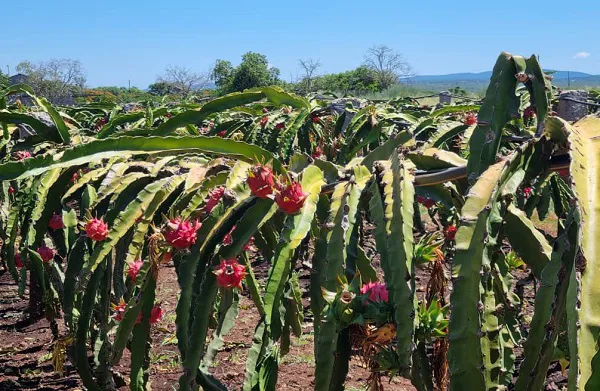
They’re not new to exports: their piquanté peppers have been receiving a rapturous response from consumers in Europe and as far afield as Türkiye.
“Europeans love the piquanté peppers, with a cream cheese filling,” he says. In June they visited Food Taipei where customers are interested in drying the piquanté peppers for condiments.
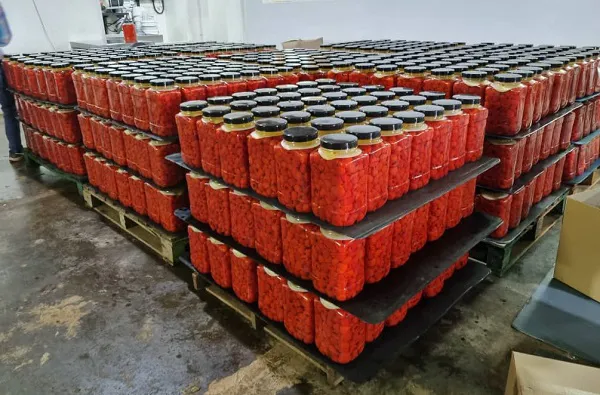
Brined and bottled piquanté peppers
Taiwanese origin to Swazi dragonfruit
Nisela Farms consists of four production units within a 10km radius, plus a banana farm 60km northwest in Kubuta, Eswatini, the only African country with diplomatic ties with Taiwan.
For Nisela Farms, the decision to stand by the beleaguered island has paid off. Four years ago they were offered white and pink dragonfruit planting material by the Taiwanese diplomatic mission and the tropical cactus has flourished in the climate of the mountainous country, entirely located within South Africa.
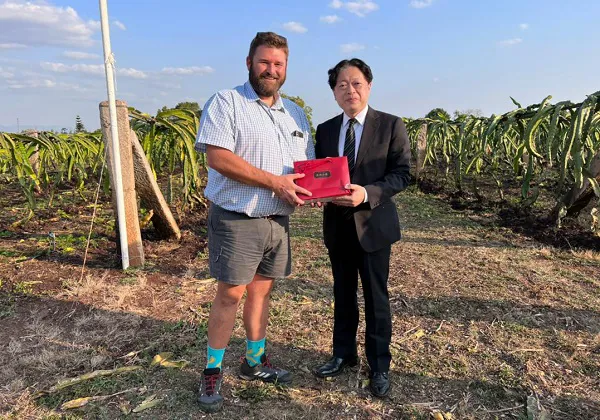
Jan Botha with Vincent Lin, director-general of international affairs at the Taiwanese diplomatic mission visiting Nisela Farms
“The dragonfruit has paid off for us big time and we just joined the Dragonfruit Association of Southern Africa,” he says. Their dragon fruit harvest has just started (about 30 to 40 days ahead of South Africa) with the last pallets sent out by late January.
Dragonfruit is, of course, not yet a very well-known fruit. In South Africa marketing to Cape Town hasn’t yet paid dividends, but through the Johannesburg fresh produce market they’re finding ready clients, especially when they redesigned their box to set off the pink of the fruit which sent prices up from R24 per kilogram to an average R36, even as much as R47. “And just because of packaging,” Jan confirms.
Gnugnu, a Swazi gin distiller, plans to attempt a dragonfruit gin this year.
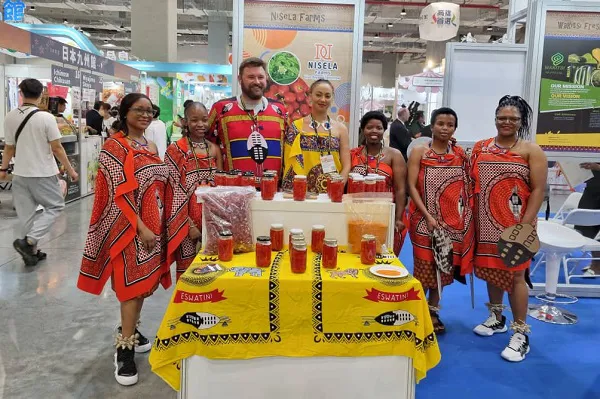
Nisela Farms at Food Taipei earlier this year
Sugarcane price increase reduce Southern African banana hectarage
Nisela owns the Swazi the banana market, Jan says, adding that he’s “100% comfortable” that Swazi-grown bananas will not be a threat to South African growers, many of whom have banana farms in Mozambique - South Africa’s major source of bananas these days.
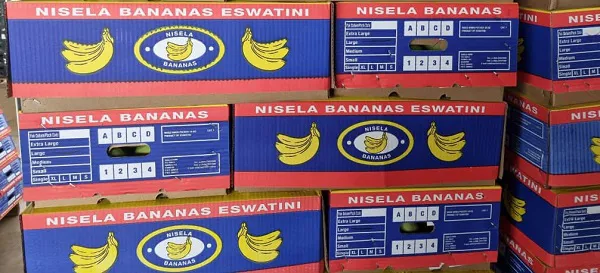
“We look after the hawkers, we look after the taxi ranks. It’s a very big market for us but they get overlooked by the bigger guys but they carried the business through the banana crash of 2021/2022. We pride ourselves on our bananas: we own the local market – all chain stores, we do all of them in Eswatini. We make sure the local quality is immaculate.”
They do not work on the market prices and they do not work on monthly fluctuations.
“We give a buyer a price for the year and if the price is better, well then, good on the stores. They’re buying a good quality banana, and if the price is worse, the stores carry us for a month or two.“
He recounts a stretch of poor quality on bananas during the past winter, which they addressed by dropping their banana price for a month to 2022 levels not only for the affected customer, but across the board.
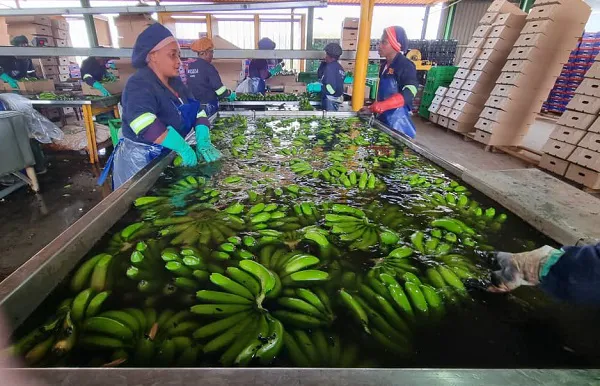
Since Freddy, the record-breaking tropical cyclone over Mozambique and northeastern South Africa in February and March which reduced available banana volumes, the sugar cane price has gone up.
Banana farmers in Komatipoort and in Maputo Province are now ripping out bananas and putting in sugar cane, he says, adding that a lot of banana farmers are also still recovering from the drought.
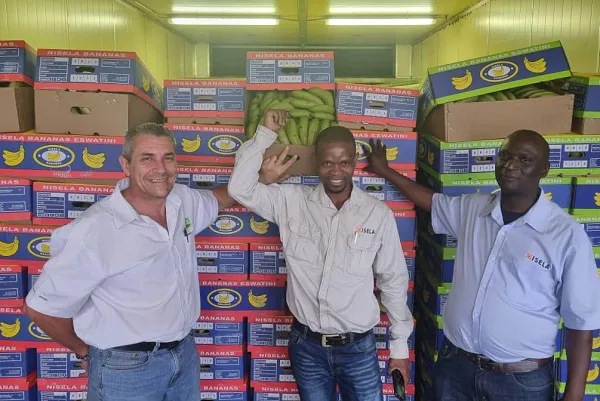
Guiliano Tommasi of RSA market agency with Nisela's two banana managers, Innocent Zwane and Thokozani Ndlangamandla
Nisela Farms drives cotton comeback
Nisela used to grow predominantly sugarcane over 4,300ha, but during a longstanding drought they learned a valuable lesson, Jan says.
“Unfortunately we had to sell Nisela Safari, a 700ha game ranch and lodge but during the nine year drought – everyone had a five year drought, in Eswatini we had a nine year drought because we only get fed from one river basin, the Ngwavuma river basin in KwaZulu-Natal. We have 99% water storage capacity, but not if it doesn’t rain up to Nhlangano and up to Piet Retief.”
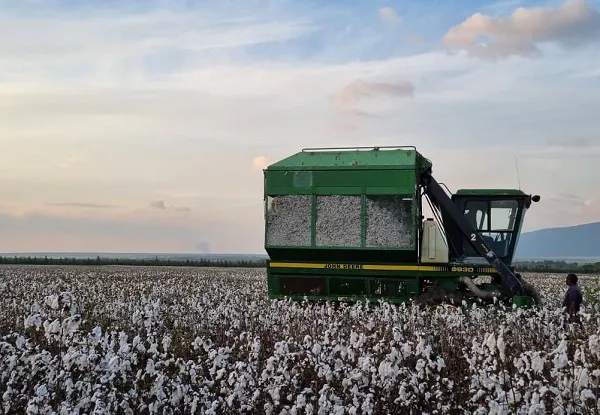
Now their composition has been modified to 1,200ha sugar cane, 300ha bananas (of which 200 ha is in Nsoko and another 100 ha at Kubuta, 60 km away). There are also sugar beans, as well as cotton making a big comeback which, Jan says, they are driving with government.
“A rare breed of person” cuts sugar cane
Cutting sugar cane by hand is exceptionally gruelling.
At Nisela, a minimum of 10 tonnes per person cut by hand per day is expected, and it takes “a rare breed of person” to cut cane. In fact, Jan remarks, the older cane cutters cut more than their juniors.
“We have a philosophy on our farms that you can’t task a person if you’ve never done a job yourself – so all of us here have cut cane. We know how tough it is, in the heat of the day. When you start here, you have to go through all the processes,” he says.
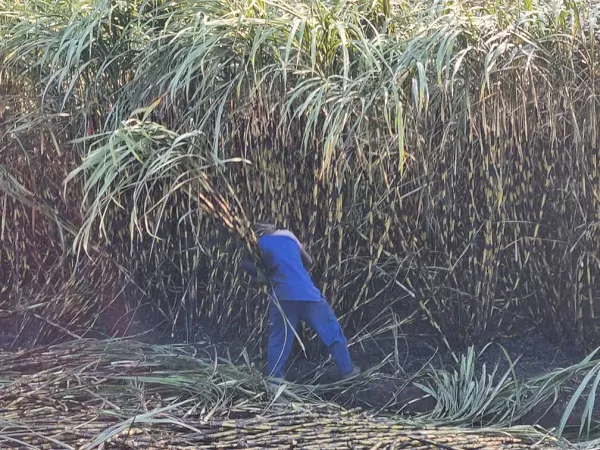
Cutting sugar cane, a gruelling task which all of Nisela's management have experienced firsthand
“South Africa has a minimum wage but not a lot of people know this, but in Eswatini we have to include a basic ration pack worth around R1,000 for our staff on a monthly basis. We are gazetted to look after our people that way.”
Almost all of Nisela’s managers started as junior personnel who worked themselves up; all of their supervisors and some of their indunas (foremen) are university graduates.
“At Nisela there is a high value placed on human capital. We’re all born and bred Swazis, without the baggage of the history there is in South Africa. We work together, we dance together and we pray together – particularly so here at Nisela.”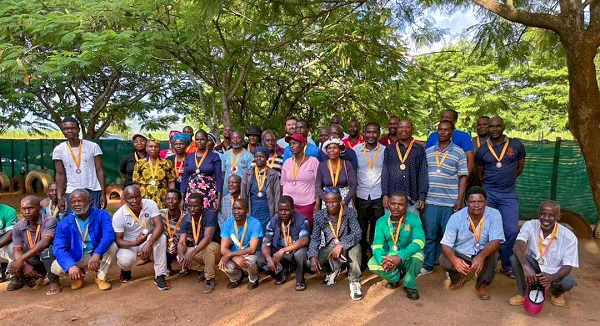
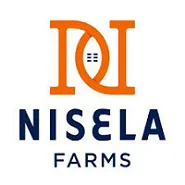 For more information:
For more information:
Jan Hendrik Botha
Nisela Farms
Tel: +268-2343-7035
Email: info@niselafarms.co.sz
https://www.niselafarms.co.sz/
